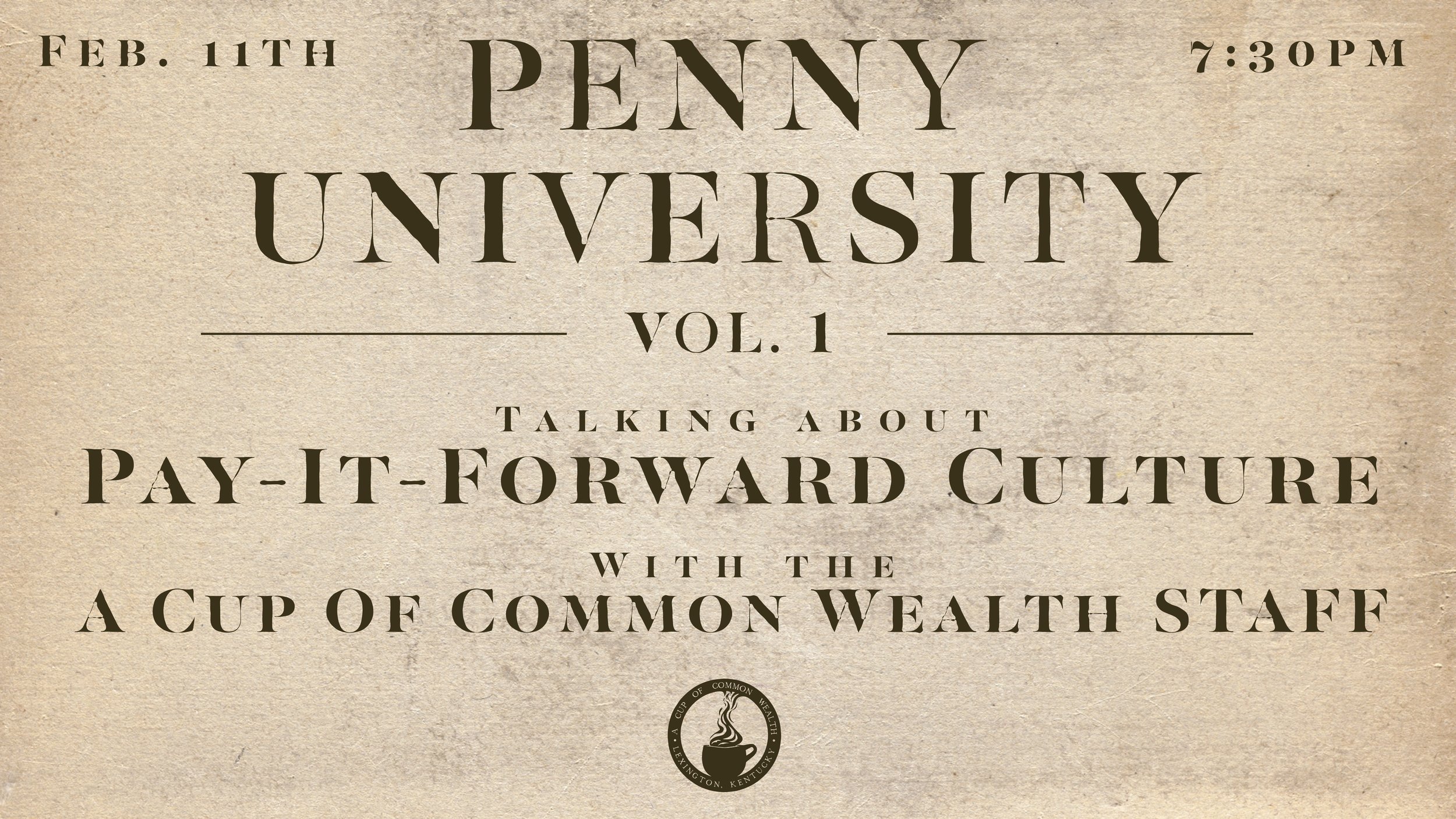Two Cents on Penny Universities
As we get ready to kick off our Penny University series with our inaugural coffeehouse chat, we wanted to give you some background on what exactly a Penny University is and why we think this concept is so important. It’s a cool story – so here’s a brief overview! Don’t worry, non-history-buffs. There’s only a few dates.
Ah the modern coffeehouse. It’s a place where many of us find ourselves on a daily basis. We grab a cup of coffee and head to the office, or for some of us, the coffee shop is the office. And for others still, the coffeehouse is merely the meeting place for a group of friends and a cup ‘o joe – no work included.
But when coffeehouses hit the market back in 1650 in Britain, teal doors, half broken chairs, and “money for jet fuel” tip jars didn’t exist. (Or maybe they did, but wouldn’t THAT be a coincidence). Rather, coffee itself was just getting to Europe and growing exponentially in popularity and volume. But what is perhaps more interesting than the hot commodity itself is what it created – the place to buy and consume it.
When coffee became a societal mainstay, a new social hub was introduced. But as warm and fuzzy as that might sound, coffeehouses weren’t initially treated as an open and welcoming social place. Their patrons became clique-y and considered themselves above those of other commercial spaces like alehouses and taverns.
As Brian Cowan discussed in his book The Social Life of Coffee, these were originally treated as a place for the “virtuosic,” catering more to a select clientele than to the general public. “Indeed, they were much more like private clubs than public houses” he writes. Characterized by an “air of exclusivity,” coffeehouses essentially became informal universities – a place for the privileged to discuss the news of the day and essentially continue their education amongst like-minded men. Despite the classism, these men set the precedent for what coffeehouses would continue to become – a space for shared knowledge.
In about a decade’s time, coffeehouses became a more inclusive space, much to what seemed to be the dismay of the elitist group of original patrons. With the English Restoration beginning in 1660 (of the English Monarchy and the onset of a new political base), the coffee shops changed with the times. They maintained their Oxford roots and claimed a different patronage than alehouses and taverns, but became a space for a much more diverse group of people (for that time, of course).
While some lamented this changing of the times, one whom Cowan referenced was pleased. He had “gathered up enough material for another sixteen lives based on anecdotes and stories he had picked up in coffeehouse chat,” and broken barriers between himself and men of different sorts.
By the eighteenth century, coffeehouses were commonplace in society. And from there, they continued to evolve into today’s coffee shops (welcome, A Cup of Common Wealth and Chocolate Holler, just a few – ahem, about 300 – years later). But what we find so interesting is that from the beginning, coffeehouses were “invested with a distinctive brand of learned, but not all pedantic sociability,” as Cowan discovered.
John Houghton, a scientist who published his findings on the contributions coffeehouses made to the advancement of learning, concluded this: “Coffeehouses make all sorts of people sociable, the rich and the poor meet together, as also do the learned and unlearned. It improves arts, merchandise, and all other knowledge; for here an inquisitive man, that aims at good learning, may get more in an evening than he shall by books in a month. He may find out such coffeehouses, where men frequent, who are studious in such matters as his inquiry tends to, and he may in short space gain the pith and marrow of the others’ reading and studies. I have heard a worthy friend of mine … who was of good learning … say that he did think that coffeehouses had improved useful knowledge as much as the universities have, and spoke in no way of slight to either of them.”
In our mind, this is the essence of a Penny University. We want to be a place for folks to come in and leave more enlightened than they came. So, we’re kicking off this series with a focus on Pay-It-Forward Culture this Sunday, February 11 at 7:30 p.m. here at A Cup of Common Wealth. We hope you’ll join us for this talk and many more to come!
Embrace. Serve. Create.

